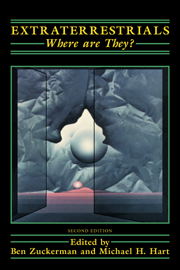Book contents
- Frontmatter
- Contents
- Preface to the Second Edition
- Preface to the First Edition
- 1 An Explanation for the Absence of Extraterrestrials on Earth
- 2 One Attempt to Find Where They Are: NASA's High Resolution Microwave Survey
- 3 An Examination of Claims that Extraterrestrial Visitors to Earth Are Being Observed
- 4 The Likelihood of Interstellar Colonization, and the Absence of Its Evidence
- 5 Pre-emption of the Galaxy by the First Advanced Civilization
- 6 Stellar Evolution: Motivation for Mass Interstellar Migrations
- 7 Interstellar Propulsion Systems
- 8 Interstellar Travel: A Review
- 9 Settlements in Space, and Interstellar Travel
- 10 Terraforming
- 11 Estimates of Expansion Timescales
- 12 A Search for Tritium Sources in Our Solar System May Reveal the Presence of Space Probes from Other Stellar Systems
- 13 Primordial Organic Cosmochemistry
- 14 Chance and the Origin of Life
- 15 The RNA World: Life before DNA and Protein
- 16 The Search for Extraterrestrial Intelligence
- 17 Alone in a Crowded Universe
- 18 Possible Forms of Life in Environments Very Different from the Earth
- 19 Cosmological SETI Frequency Standards
- 20 Galactic Chemical Evolution: Implications for the Existence of Habitable Planets
- 21 The Frequency of Planetary Systems in the Galaxy
- 22 Atmospheric Evolution, the Drake Equation and DNA: Sparse Life in an Infinite Universe
- About the Editors and Contributors
- Author Index
- Subject Index
Preface to the First Edition
Published online by Cambridge University Press: 20 October 2009
- Frontmatter
- Contents
- Preface to the Second Edition
- Preface to the First Edition
- 1 An Explanation for the Absence of Extraterrestrials on Earth
- 2 One Attempt to Find Where They Are: NASA's High Resolution Microwave Survey
- 3 An Examination of Claims that Extraterrestrial Visitors to Earth Are Being Observed
- 4 The Likelihood of Interstellar Colonization, and the Absence of Its Evidence
- 5 Pre-emption of the Galaxy by the First Advanced Civilization
- 6 Stellar Evolution: Motivation for Mass Interstellar Migrations
- 7 Interstellar Propulsion Systems
- 8 Interstellar Travel: A Review
- 9 Settlements in Space, and Interstellar Travel
- 10 Terraforming
- 11 Estimates of Expansion Timescales
- 12 A Search for Tritium Sources in Our Solar System May Reveal the Presence of Space Probes from Other Stellar Systems
- 13 Primordial Organic Cosmochemistry
- 14 Chance and the Origin of Life
- 15 The RNA World: Life before DNA and Protein
- 16 The Search for Extraterrestrial Intelligence
- 17 Alone in a Crowded Universe
- 18 Possible Forms of Life in Environments Very Different from the Earth
- 19 Cosmological SETI Frequency Standards
- 20 Galactic Chemical Evolution: Implications for the Existence of Habitable Planets
- 21 The Frequency of Planetary Systems in the Galaxy
- 22 Atmospheric Evolution, the Drake Equation and DNA: Sparse Life in an Infinite Universe
- About the Editors and Contributors
- Author Index
- Subject Index
Summary
Where are they? Enrico Fermi is reputed to have asked this question at the dawn of the atomic age. He must have been wondering why, having discovered and tamed nuclear energy sources, advanced extraterrestrials were not in evidence here on Earth or out in the skies.
During the 1960s and early 1970s, Fermi's question was largely forgotten or ignored. Advances in radioastronomy, the American and Soviet space programs, the blossoming of the study of molecular biology and progress in laboratory simulations of prebiological organic chemistry all contributed, in their own way, to a euphoric belief among many scientists that life in the cosmos is commonplace and might even be discovered soon. At a more popular level, numerous reports of close encounters of the second and third kind, lavishly bankrolled science fiction movies and enormously popular books on ancient astronauts all served to promote the idea that They are out there and will soon be, or already have been, here.
The past few years have seen the introduction of new and sobering input into this picture. The US program of planetary exploration, while highly successful from a technological and scientific standpoint, has failed to produce even a hint of an extraterrestrial biology. Although the search for simple nonterrestrial life in our solar system cannot be considered complete, the prospects for eventual success do not look good. In addition, searches for evidence of advanced technology, either in deep space or in the solar system, have been discouraging.
Information
- Type
- Chapter
- Information
- ExtraterrestrialsWhere Are They?, pp. xi - xiiPublisher: Cambridge University PressPrint publication year: 1995
